You may have noticed the world becoming more eco-friendly in recent years — or at least, so it would appear. But if you’ve ever picked up a product because the packaging had the word “natural” on it or looked recycled, you may have been a victim of greenwashing.
Greenwashing is the practice of making brands appear more sustainable than they really are. It may involve cynical marketing ploys, misguided PR stunts, or simply changing the packaging of an existing product while continuing to use unsustainable ingredients or practices. It’s a way for companies to appear like they care while also increasing their profit margins, as they’re fully aware that eco-conscious people are willing to part with more money for sustainable products.
You might remember the controversy back in 2019 when McDonald’s introduced paper straws that turned out to be non-recyclable. Aside from the questionable practice of cutting down trees to make disposable straws, this was a classic example of a corporate giant pretending to address an issue — in this case, plastic pollution — without actually doing anything.
Another cynical greenwashing move is to slap a green label on something to make it appear more sustainable or healthy, as Coca-Cola did with Coca-Cola Life — that with 6.6% sugar was far from a healthy drink. You’d probably get less Life if you drank a lot of it.
Unfortunately, greenwashing seems to be a trend that’s here to stay. Companies are constantly coming up with new and brilliant ways to tell us lies. One of the best things people can do to protect themselves from these corporate cons is to get familiar with recent greenwashing examples. Awareness of the tricks they use can help you spot other talented greenwashers more easily, so let’s take a look at some greenwashing lowlights from the last couple of years.
Greenwashing examples: recent stand-out cases
- Innocent: insincere TV adverts
- Keurig: misleading recycling claims
- Ikea: accredited illegal logging
- Windex: misleading plastic packing claims
- H&M: insincere sustainable fashion claims
- Hefty: false representation of the product
- Ryanair: false low-emissions claims
- Quorn: unverifiable carbon-footprint claims
- Shell: gaslighting of the general public
- Unilever: unclear environmental claims
- HSBC: misleading climate ads
- Delta: false carbon-neutrality claims
- Active Super: misrepresented investment strategy
- Anglian Water: concealing pollution
- Danish Crown: misleading climate claim
And before getting started, here’s a graphic that explains ways to spot greenwashing outside of the cases shown here. Skip over to get straight to those examples though.
1. Innocent
- Year: 2022
- Who called it out: Plastic Rebellion
- Type of greenwashing: insincere TV adverts
- Where: UK
When greenwashing, companies project an eco-friendly image which is untrue. Sometimes the disguise is hard to detect but in other cases the veneer strays so far from the truth that you begin to question the sobriety of the PR & Marketing teams behind the greenwash. Did they really think that would work?
Innocent Drinks is a prime example of the implausible approach. The company is owned by Coca Cola, the worst plastic polluter in the world. The company also uses single-use plastic – which is terrible for the environment. Yet, someone, somewhere, thought it’d be a convincing idea to release twee TV cartoon adverts – featuring cute animals singing songs about recycling and fixing the planet. In an effort to connect the brand with these contradictory causes.
It’s greenwashing, pure and simple. It’d be funny if it weren’t for the dire consequences of all that plastic pollution.
Luckily, the ASA stepped in and banned the ludicrous ads after they were reported by Plastic Rebellion.
2. Keurig
- Year: 2022
- Who called it out: The Competition Bureau
- Type of greenwashing: misleading recycling claims
- Where: Canada
The global coffee capsule market is worth over $10billion and growing fast. But the mountain of discarded capsules remains difficult to recycle. The problem is you typically have to use specialist recycling services instead of local recycling bins.
As a case in point of how the recycling process can go badly wrong. Keurig led Canadian buyers to believe they could recycle their single-use plastic coffee pods by simply breaking open the top, emptying out the coffee, and throwing the empty carcass into recycling bins. Easy right?
Wrong. The capsules weren’t accepted in most Canadian provinces, except for Quebec and British Columbia. And even then the instructions didn’t go far enough. The City of Toronto had to revert 90 tonnes of plastic pods from recycling bins last year because of this kind of capsule carnage.
Keurig were fined $3million and ordered to change the misleading recycling claims on the packaging.
Pro tip: at Akepa we find a coffee from our attentive local baristas is way, way better than a mediocre coffee from a pod!
3. IKEA
- Year: 2020
- Who called it out: Earthsight
- Type of greenwashing: accredited illegal logging
- Where: EU (Sweden) /Ukraine
IKEA is the largest consumer of wood in the world, and its timber consumption has doubled in the last decade. An investigation by Earthsight found that IKEA has been making beechwood chairs using illegally sourced wood from the forests of Ukraine’s Carpathian region, an area home to endangered beasts such as bears, lynxes, wolves, and bison.
Perhaps the most shocking thing about this case is that the illegal timber was certified by the Forest Stewardship Council. This oversight raises serious questions about the ethics and transparency of the FSC accreditation, which according to Earthsight, is not limited to Ukraine. They describe “rampant illegal logging” across the globe under the watchful eye of the FSC.
In spite of this, IKEA is among the best in the world in terms of its sustainability credentials, and FSC is considered the gold standard of forest accreditation.
4. Windex
- Year: 2019-20
- Who called it out: Packaging 360, Owen Rosenberg
- Type of greenwashing: misleading plastic packaging claims
- Where: USA
The glass cleaner by SC Johnson claimed its bottles were made from 100% “ocean plastic”. But before you start imagining intrepid teams of Windex employees out on boats salvaging plastic from the sea, let me stop you right there — because that’s not what happened.
In fact, the plastic used to make the bottles was never in the ocean. It was pulled from plastic banks in Indonesia, the Philippines, and Haiti. This type of plastic is known as ocean-bound plastic because it would have otherwise ended up in the ocean.
But the problematic marketing doesn’t end there. Windex also claims to be non-toxic, but a lawsuit was filed against SC Johnson in 2020, claiming that Windex products contain ingredients that are harmful to people, animals, and the environment.
5. H&M & Fast Fashion
- Year: 2021
- Who called it out: Changing Markets Foundation
- Type of greenwashing: insincere sustainable fashion claims
- Where: EU
The fast fashion industry is notorious for its environmental impact, so a level of greenwashing is to be expected there. But you might be surprised at the sheer amount of greenwash that was revealed in a 2021 report from the Changing Markets Foundation.
They looked at clothing from major high-street fashion brands to check the truthfulness of their sustainability claims and found 60% of claims overall were misleading. That’s bad but H&M were found to be the worst offenders with a shocking 96% of their claims not holding up.
Put simply, virtually all of the Scandinavian Fashion Giant’s claims were designed to trick people concerned about their environmental impact into buying.
So, the next time you consider buying from a major retailer like H&M because of imprecise green-tinged language like ‘conscious’, reconsider. The percentages say we’re likely being lied to.
6. Hefty Recycling Bags
- Year: 2021
- Who called it out: Lisabeth Hanscom
- Type of greenwashing: false representation of the product
- Where: USA
In May 2021, a class-action lawsuit was filed against Hefty Recycling Bags for the claim that its bags are “designed to handle all types of recyclables”. According to the lawsuit, not only are Hefty bags not recyclable but they also contaminate waste that would otherwise have been recyclable. This means many items that could have been recycled end up in landfills instead.
Hefty bags are therefore no different from ordinary bin bags (and possibly even worse), and the lawsuit claims their misleading branding violates California’s anti-greenwashing laws.
7. Ryanair
- Year: 2020
- Who called it out: Advertising Standards Authority (ASA)
- Type of greenwashing: false low-emissions claims
- Where: UK
Mid-flight ads, misleading luggage charges, uncomfortable seats. These are just a few of the reasons why people dislike flying Ryanair – and now you can add another complaint to the list: greenwashing.
In early 2020, Ryanair audaciously announced itself to the British public as Europe’s “lowest emissions airline”. The claim was more or less made up and the Advertising Standards Authority promptly banned the ads.
It’s a reminder that in environmentally sensitive sectors like aviation, you need to be extra careful as brands are all too eager to promote their green credentials to win more customers. Often the claims made just aren’t true.
8. Quorn Foods Thai Wonder Grains
- Year: 2020
- Who called it out: Advertising Standards Authority (ASA)
- Type of greenwashing: misleading and unverifiable carbon footprint claims
- Where: UK
Quorn Foods advertised their new product, the Thai Wonder Grains lunch pot, as a way to address climate change. The advert claimed it “helps us reduce our carbon footprint”, but what wasn’t clear was who exactly they meant by “us”.
It turns out they were referring to Quorn Foods, and not ordinary folk, who should avoid buying products that come in single-use plastic if they want to reduce their carbon footprint.
An inquiry by the Advertising Standards Authority ruled that the ad was misleading. It also noted that since the product in question was new, it was impossible to determine whether it could reduce Quorn’s carbon footprint.
9. Shell
- Year: 2020
- Who called it out: The Internet
- Type of greenwashing: gaslighting of the general public
- Where: Worldwide
Shell’s got some balls. The company is responsible for around 1-2% of global CO2 emissions from its activities every year, while it continues to plough ahead and invest billions in oil and gas. And yet, despite this, their marketing team thought it appropriate to ask their followers on Twitter what they were “willing to change to help reduce emissions”? Really?
The poll attracted a modest 199 responses but still went viral due to the wave of vitriol it received in response, including high-profile rejoinders from the likes of Alexandra Ocasio-Cortez and Greta Thunberg.
This truly was one of greenwashing’s most egregious examples. But only a few months later, some karma was served when a European court ordered Shell to reduce their carbon emissions by 45% by 2030 compared to 2019 levels. It’s the first time that a private company has been ordered to reduce its emissions by a fixed amount with a defined time frame.
If that wasn’t enough, here’s another case that took a whole year before reaching its end. Are we surprised that Shell has engaged in greenwashing more than once? Not really.
- Year: 2023
- Who called it out: Adfree Cities
- Type of greenwashing: misleading ads about clean energy business
- Where: UK
In June 2022, the gas and oil giant launched a marketing campaign – featuring billboard posters, a YouTube ad, and a TV commercial – to promote their clean energy business in Bristol and the UK as a whole. The advertisements included misleadings claims about Shell’s involvement in providing clean energy and e-vehicle charging stations. In the physical billboards, they actually dared to say, “In the South West 78,000 homes use 100% renewable electricity from Shell Energy.” In reality, it’s coming from the country’s National Grid – a fact that was mentioned, albeit in much smaller writing.
Campaign group Adfree Cities filed a complaint to the ASA, arguing the commercials failed to give information on Shell’s total environmental impact. The company does engage in clean energy, but their business resulted in CO2 emissions of 1.2 billion tonnes last year alone. Spending on gas and oil production is still expected to increase. Somehow, their net-zero target is set for 2050.
The campaign was finally banned a year after its launch, but doubts remain. Stricter regulation is needed to stop false messaging where fossil fuels are concerned.
What else is next, Shell?
10. Unilever
- Year: 2022
- Who called it out: Advertising Standards Authority (ASA)
- Type of greenwashing: unclear environmental claims
- Where: UK
Unilever’s cleaning brand Persil is one of the UK’s most popular, with its washing-up liquid and dishwasher tablets used by millions of people each year. Many of those buyers are becoming concerned about the environment, so it’s not surprising that Unilever has upped its efforts to appear eco-friendly. Nevertheless, Persil’s ‘Dirt is Good’ TV ads have been banned by the Advertising Standards Authority for unsubstantiated claims to be ‘kinder on the planet’.
It’s the kind of perfunctory statement that’s not unusual from greenwashers, although in this case adorned by flimsy supporting scenes, such as a woman hashtagging #plantmoretrees on social media – and kids collecting plastic garbage from rivers and beaches. None of which explained why Persil was kinder on the planet.
The ASA took umbrage with the ‘various strands’ for being ‘unclear’. Kinder on the planet than what exactly? Meteorites, maybe. But all considered it’s fair to conclude that Persil, a typical laundry detergent, can’t be all that kind on the planet.
What to learn from this? It’s a case that shows if you are going make environmental claims these days then they need to be backed up. Someone tapping out an appropriate hashtag won’t do at all.
11. HSBC
- Year: 2022
- Who called it out: Advertising Standards Authority (ASA)
- Type of greenwashing: misleading climate ads
- Where: UK
According to lots of credible sources, the world’s biggest banks are funding the climate crisis, mainly through investments with a significant impact on greenhouse gas emissions – especially fossil fuels.
HSBC ranks 13th for the top banks financing fossil fuels in the UK. And still finances carbon-heavy industries like thermal coal mining. Yet, a bit of progress in greenwashing awareness was seen when 45 people complained to the Advertising Standards Authority that HSBC’s advertisements were misleading. The offending ads were then banned but you can still see them in the image below.
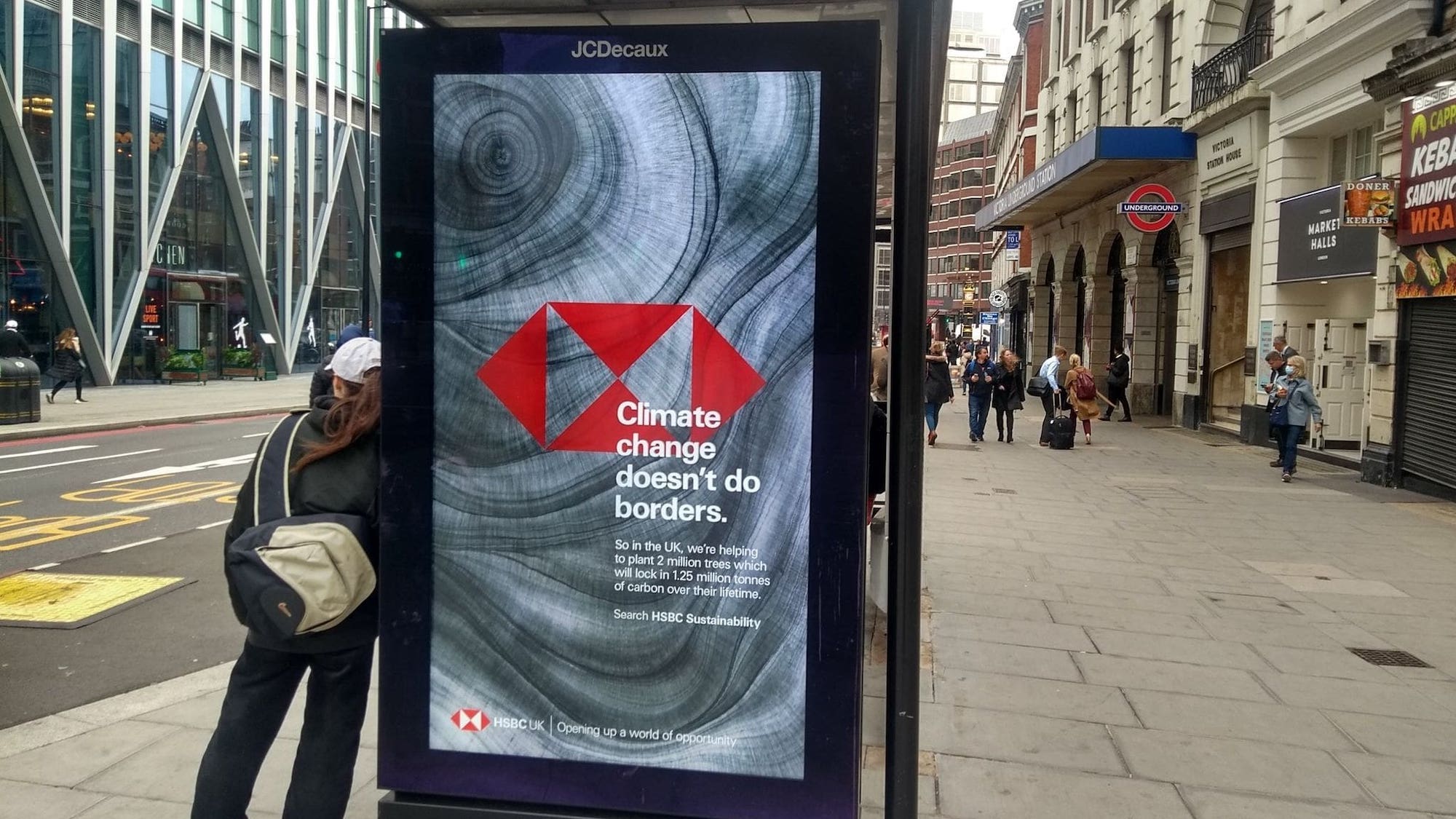
HSBC argued that they’re financing many of these industries to help them eventually transition to net zero, and it would be impractical to terminate funding. But while they highlighted their climate-friendly initiatives in their adverts, they failed to mention their considerable contribution to the climate crisis at the same time – an estimated $8.7 billion into new oil and gas in 2021.
It’s an environmental nuance that was absent in the ads – and that, our friends, is greenwashing.
An irony of all this is that the day before the adverts were banned, HSBC were running workshops on how to spot and deal with greenwashing. They might need to take their own advice…
12. Delta Airlines
- Year: 2023
- Who called it out: consumer class action lawsuit
- Type of greenwashing: false carbon-neutrality claims
- Where: USA
It’s not a sin to enjoy travelling, to want to discover new places and visit worldly wonders. But let’s be honest, it’s extremely difficult, if not impossible, to make a trip carbon-neutral when flights are involved. Airplanes burning fossil fuels are one of the biggest contributors to CO2 emissions. So while engineers and scientists search for alternative solutions, it’s nothing more than a reality we should be aware of and think twice about.
Which begs the question: exactly how delusional was Delta Air Lines when they thought it was okay to send this message in consumer-facing advertising?
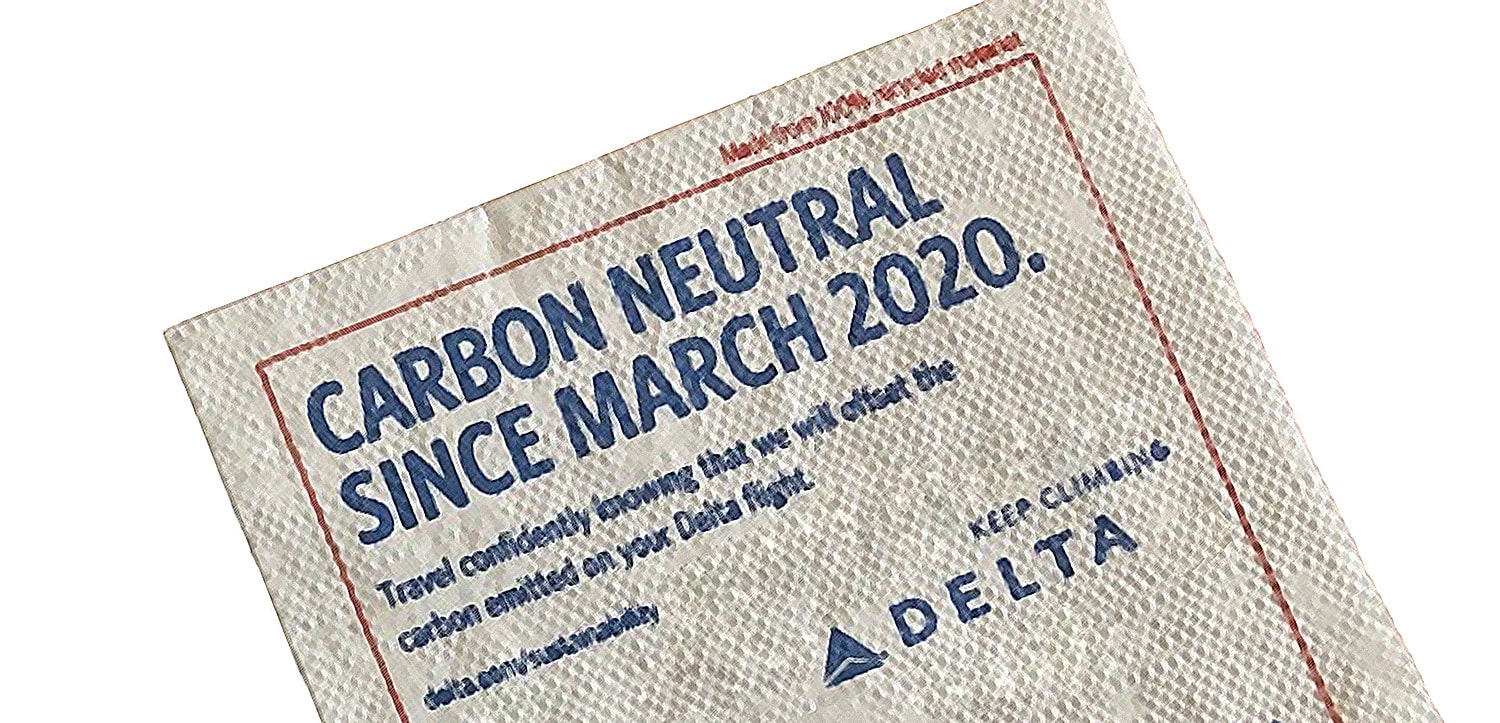
Back in 2020, Delta pledged $1 billion – for a plan including carbon offset credits and supposed reduced use of jet fuel – to cut the emissions created by its business. It’s generous, sure.
But now, California’s residents are trying to sue the company over their statement, “the world’s first carbon-neutral airline”.
The case is proof of the power of marketing, showing how deceptive such a claim can be. Even when facts aren’t there to back it up. But more than that, it speaks to the long overdue need for greenwashing regulation.
13. Active Super
- Year: 2023-2024
- Who called it out: Australian Securities and Investments Commission (ASIC)
- Type of greenwashing: misrepresentation of ESG-related investments
- Where: Australia
What does it say when financial institutions are largely responsible for the obscene jump in greenwashing scandals this year? When money (and profit) is on the table, the truth always seems to be a bit more open to interpretation.
Active Super, one of Australia’s biggest superannuation funds, has been linked to sustainability and responsible investments for years. It was even named Money Magazine’s ESG Super Fund Leader for 2022. This sparkling reputation had to be investigated after Australia’s Securities and Investments Commission (ASIC) sued them for greenwashing.
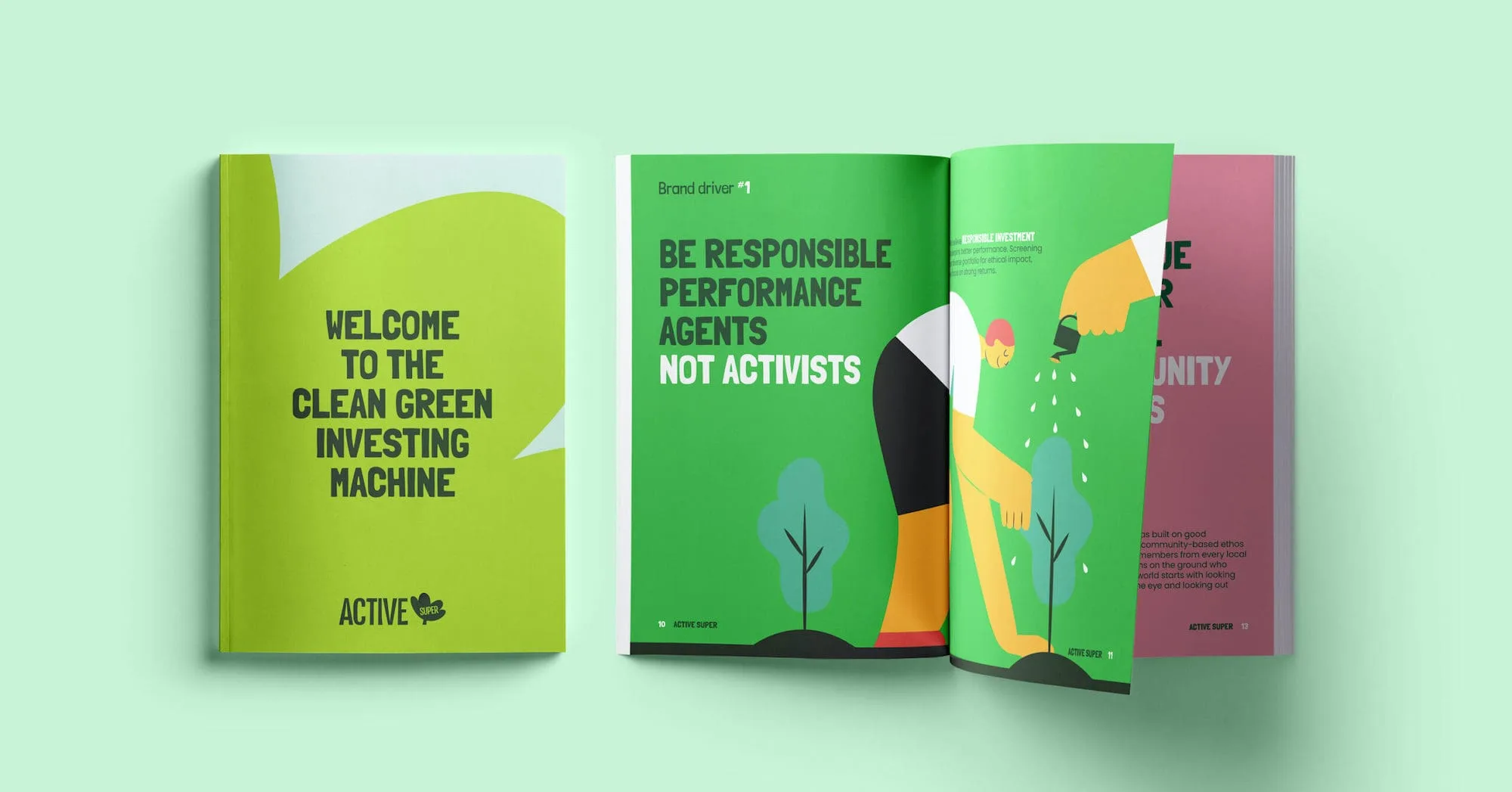
Active Super said they would stop investments that were harmful to the environment and community, including tobacco manufacturing, oil tar sands, and gambling. Russia, because of the invasion of Ukraine, was also supposed to be off-limits. Yet ASIC found evidence that says otherwise: holdings in the very type of businesses that aren’t people- or planet-friendly. And in Russian securities, too.
In June 2024, Active Super was found guilty by Australia’s Federal Court. At the time of making the claims, Active Super was holding stakes in a tobacco company, Russian oil and gas firms, and a coal mining company, among others.
14. Anglian Water
- Year: 2023
- Who called it out: Advertising Standards Authority (ASA)
- Type of greenwashing: concealing pollution record
- Where: UK
In 2022, 10 UK water companies, including Anglian Water, repeatedly discharged sewage into rivers and seas – totalling an average of 824 filthy spills a day.
So it was cheeky of Anglian Water to then release a TV ad campaign, claiming “everything we do today is for tomorrow” and how the company cleans water by creating wildlife-friendly wetlands. Of this ‘everything’, their hefty sewage spills, which were certainly something, somehow got overlooked.
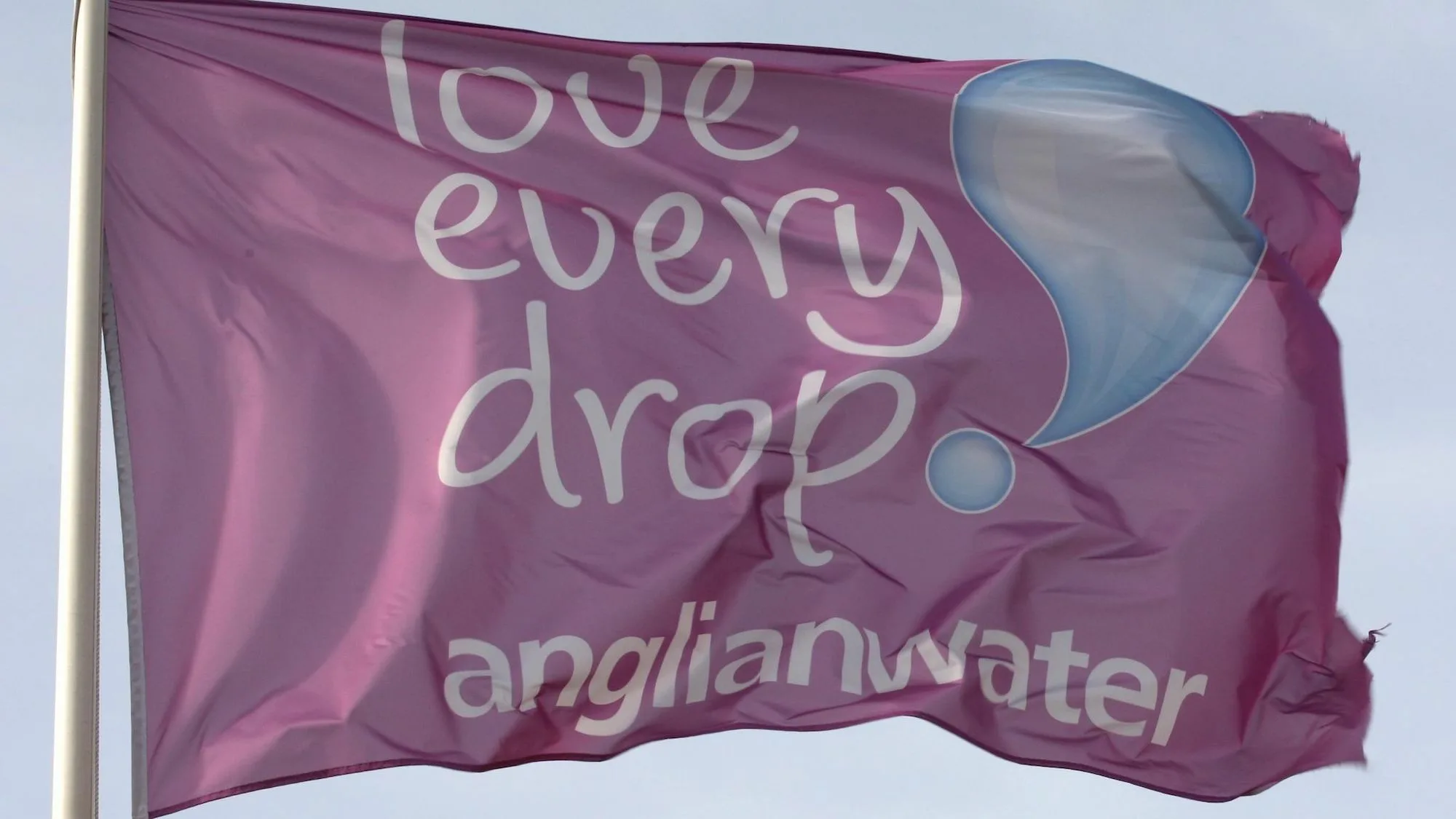
And for that glaring omission, the ASA banned the ad. They did say that Anglian Water were carrying out activities that could have a positive impact on the environment. But they felt that Anglian Water’s message was contradictory, because they also had a history of activities that were harmful to the environment (including fines) – and chose to omit this information.
Take it from us as a sustainable marketing agency: this is why it’s important that when you err environmentally, to admit your faults while moving forward. Don’t just shove it under the rug and hope nobody notices. Because they will. It can then taint the genuine action that you’re taking.
15. Danish Crown
- Year: 2021-2024
- Who called it out: Vegetarian Society of Denmark and The Climate Movement
- Type of greenwashing: misleading climate claim
- Where: Denmark
In Denmark’s first lawsuit tackling greenwashing, Europe’s largest pork producer, Danish Crown, was taken to court and found guilty. In a victory for climate and animal welfare advocates, the Western High Court in Viborg asserted that Danish Crown misled its customers in its ‘Climate-Controlled Pork’ campaign, where it stated that “Our pigs are more climate-friendly than you think”.
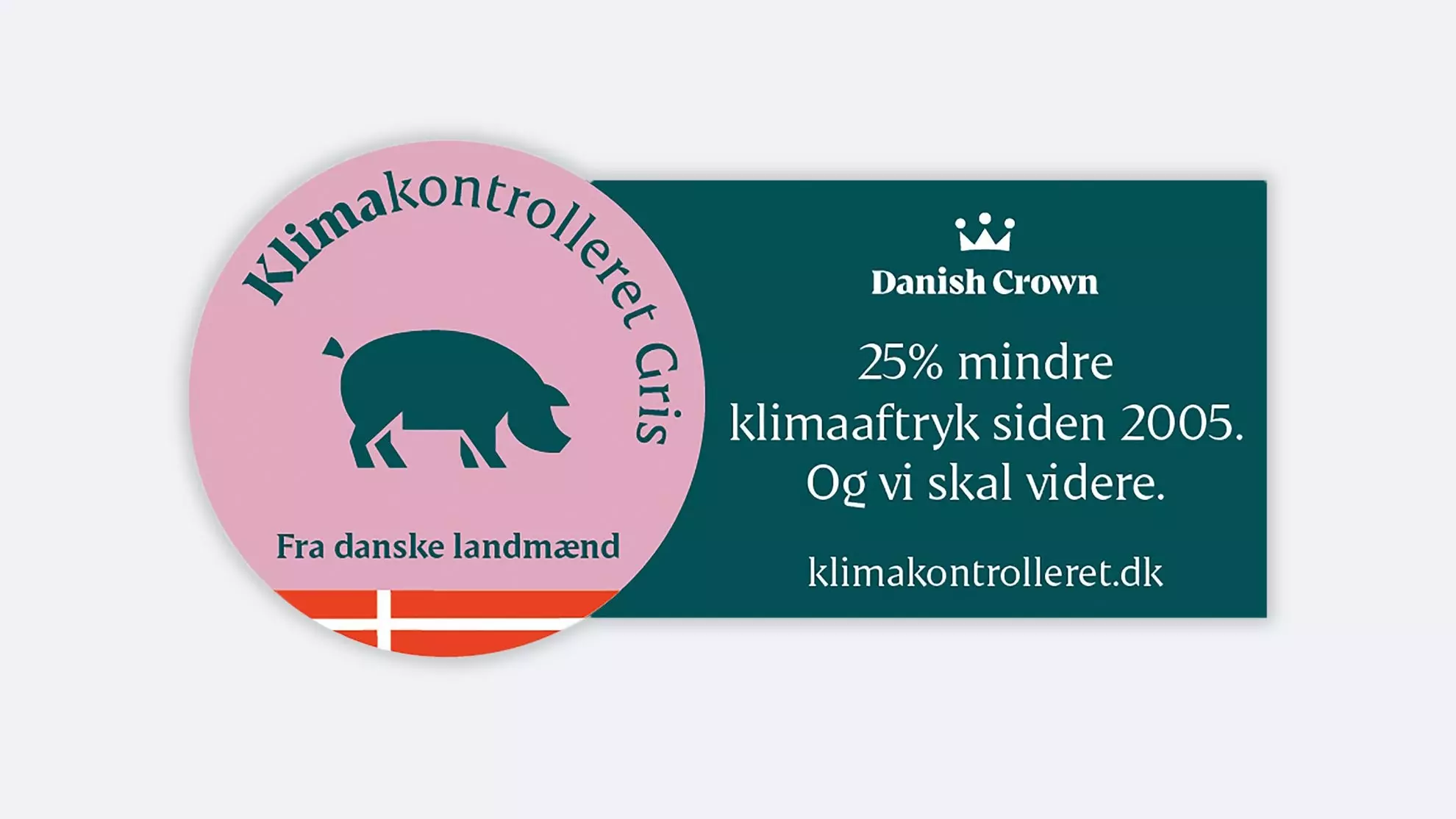
Although the court found that the phrase “more climate-friendly than you think” wasn’t a fragrant violation, it ruled that the pink stickers claiming the pigs were “climate-controlled” violated Denmark’s marketing act as the label wasn’t subject to independent control. Danish Crown stopped using the label in 2021. But it wasn’t until 2024, following the court ruling, that the pork producer conceded it had greenwashed.
With a bit of luck, greenwashing’s days will be numbered – especially with the new laws from the EU coming in 2024. People are getting tired of the same old corporate tricks and want to support brands that are truly sustainable. That’s why at Akepa, we’re committed to helping sustainable brands with their marketing so that consumers can make better, more informed, and more sustainable choices. Get in touch with us to learn more about our sustainable marketing agency.

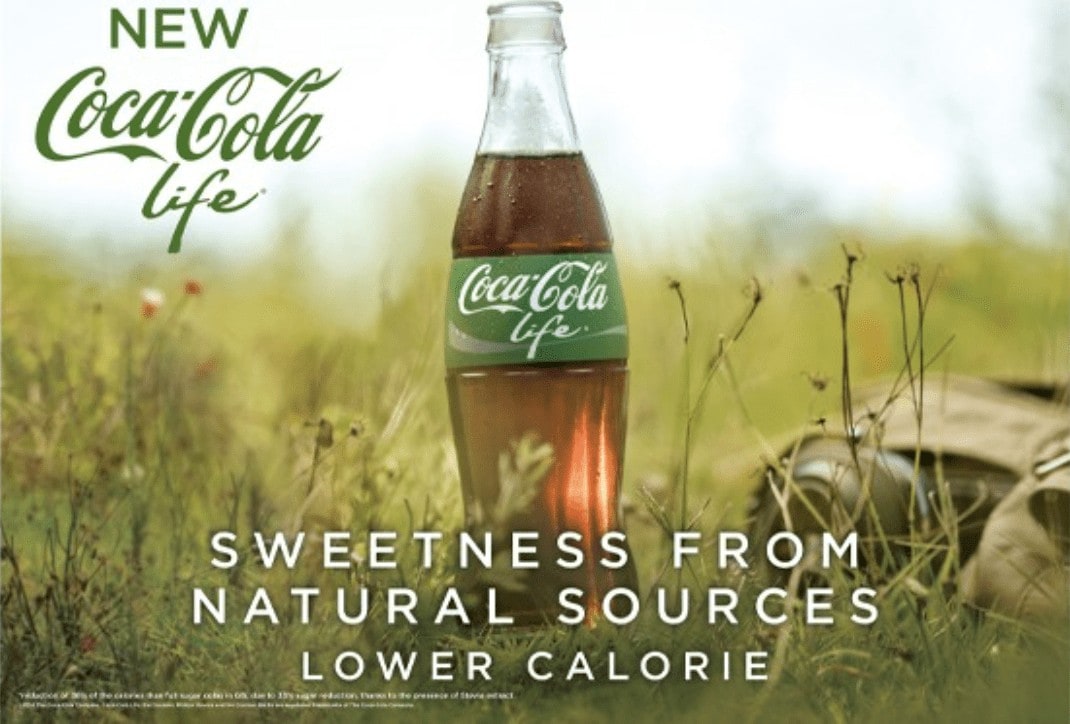
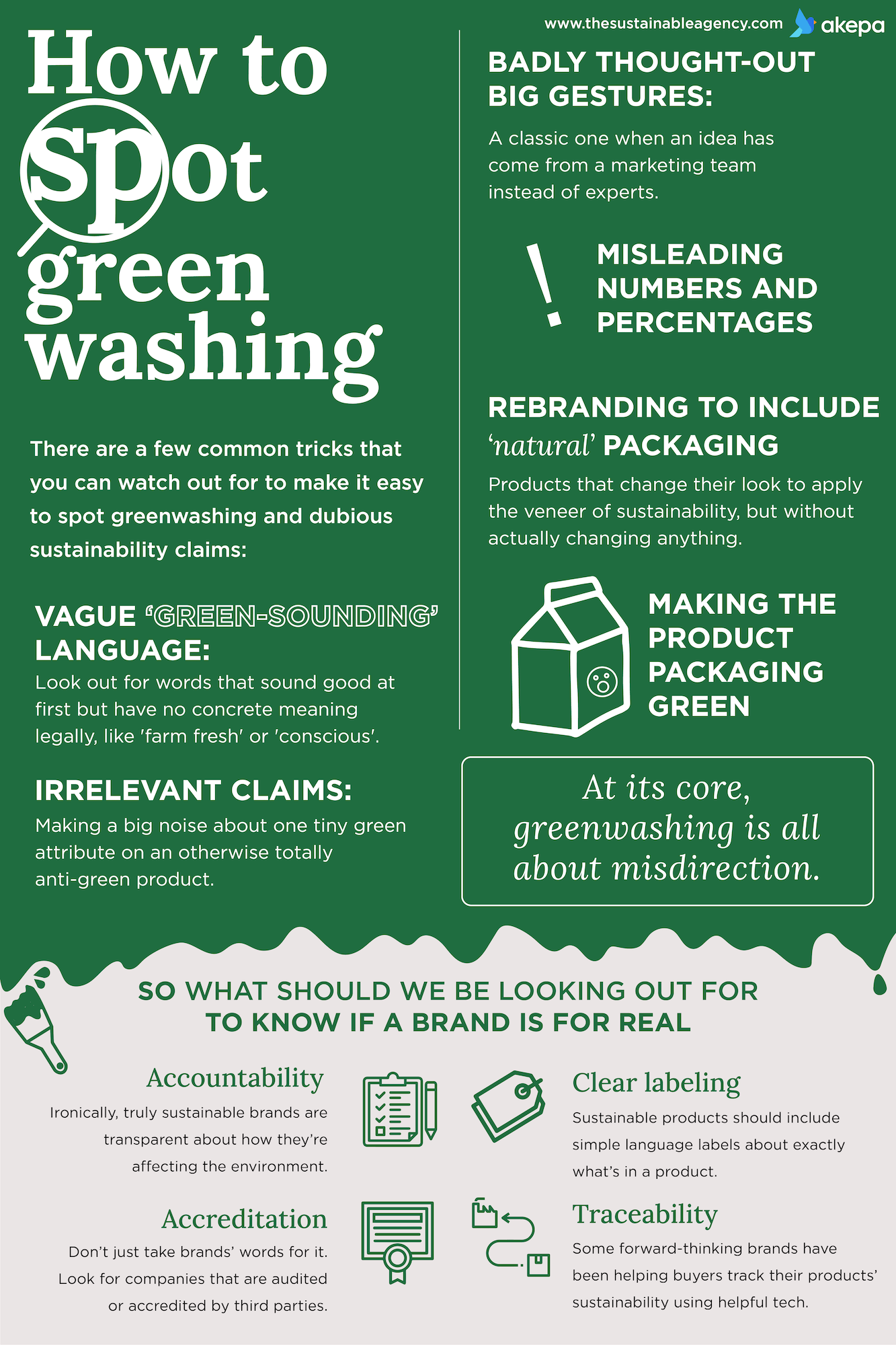
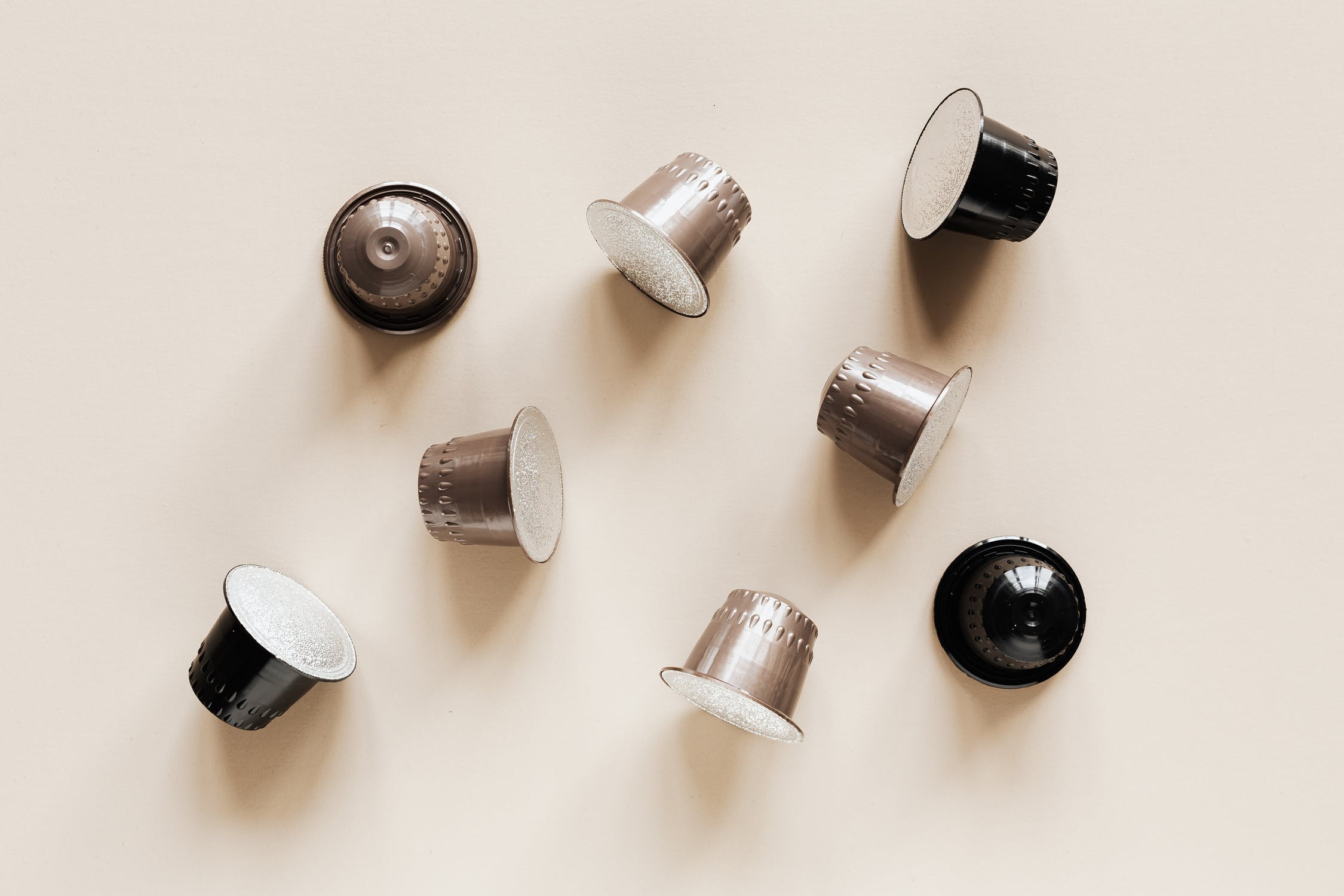
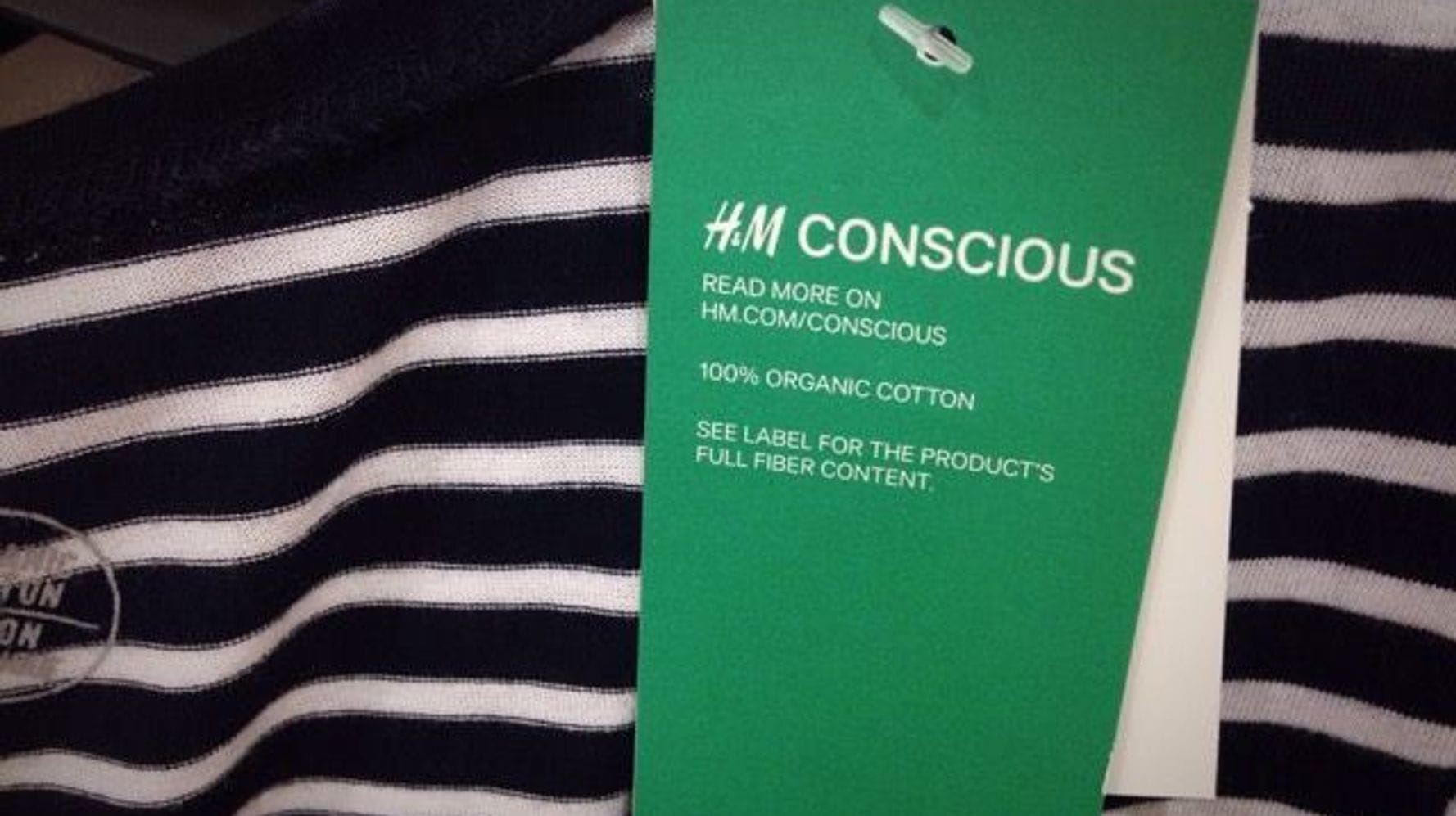
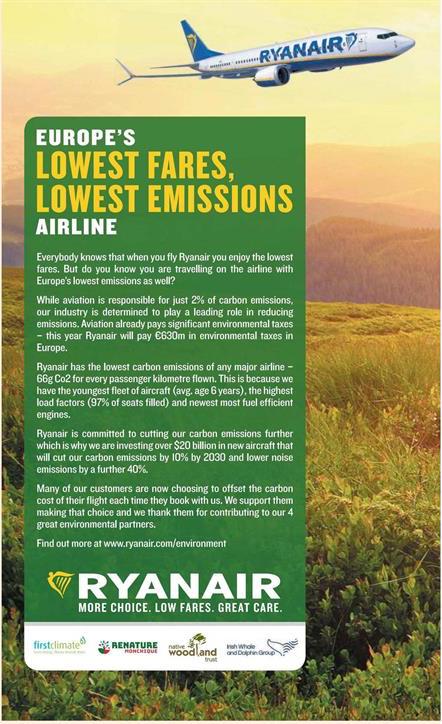
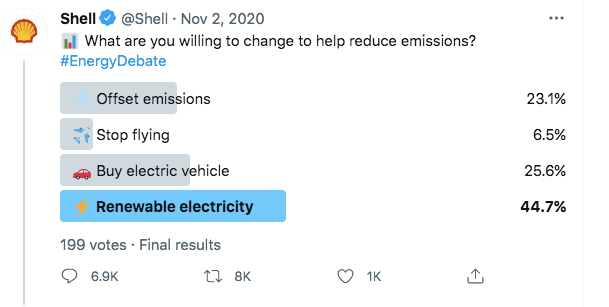


Thanks for these examples/cases, hoping we, (and I can include myself and you guys) the somehow responsible and eco-friendly driven human beings, could somehow gather/meet up and push towards real change and mitigation, against the NON-human and anti-environment organizations, laws, and people.
Thanks for the reply Daniel – here’s hoping!
“In spite of this, IKEA is among the best in the world in terms of its sustainability credentials, and FSC is considered the gold standard of forest accreditation.” – Great that you show some moderation! Very welcome in this day and age.
I would like to nominate for a greenwashing award the web page for RMax roof insulation: https://www.rmax.com/why-polyiso-green-building-design . The web page claims that making roofs more energy efficient is like planting trees, and that planting trees has lots of great benefits, then lists various benefits of planting millions of trees, along with pretty photos of those benefits. To claim that increasing roof energy efficiency has anything to do with recycling water or avoiding erosion is ludicrous. Here’s their argument: There are lots of roofs. If roofs were better insulated to reduce energy consumption by 10%, it would be like planting 344 million trees. Planting that many trees would generate lots of oxygen, control pollution, recycle water, control soil erosion, and be like removing millions of cars from the road for one year.
It is surprising to note some big names on this list. They should be setting an example, but certainly not of this sort.
very good contenido
Am surprised at the level and scale of green washing which these MNC’s have done. Unless called out, it will be difficult for lay people to understand and decipher the same. More than penalty that may be levied by the regulators, it should also put a restraint on advertising of their products for a cooling period of say 3 to 6 months. To my mind, that will bring a lot of self regulation.
Can this list be used for research purposes? I m doing msc and could use this as data collection citing your agency due credit for this info?
It can Abdul! I’ll send you an email so you can follow up with any questions.